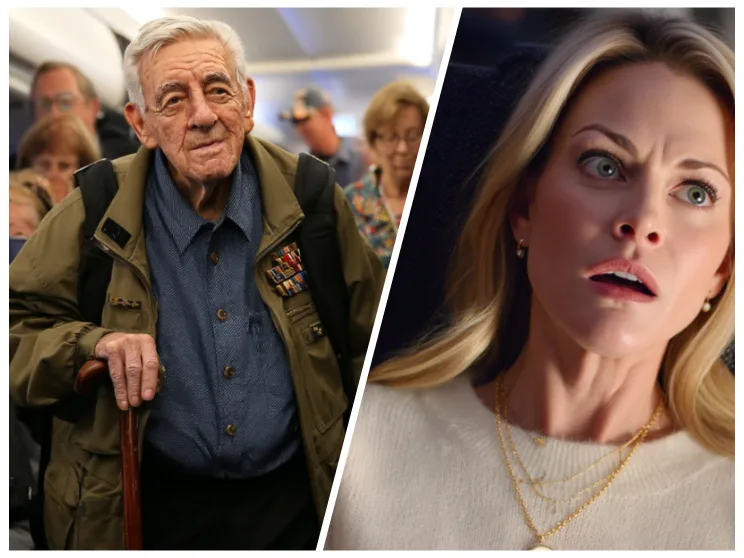Elise stepped into the cabin with her daughter beside her, instantly aware of the restless energy pressing in from every direction. Something about the air felt charged—just oddly expectant, as though the flight held more weight than a routine trip should.
Passengers shuffled forward, impatient and cramped, but Elise’s attention drifted to an elderly man in a military jacket struggling to steady his small carry-on. The determination in his posture contrasted with the tremor in his hands, and something about the image pulled at her unexpectedly.
Before she even realized she was moving, Elise reached out to help. The bag lifted easily from his grasp, and the veteran looked at her with a startled softness, as if assistance was something he’d forgotten how to receive. Elise offered a quick smile, hoping to ease his embarrassment.
As they edged down the aisle, Elise noticed he was assigned a tight middle seat between her and her daughter. He stared at it with a guarded resignation, clearly trying not to be a burden. She felt a tug of sympathy, stronger than she expected for a man she’d only just met.

“Take my aisle seat. I can sit in the middle, next to my daughter,” she said, quietly but firmly. She gestured toward the window, already stepping aside. The veteran hesitated, searching her face as though asking whether she truly meant it. Elise nodded, and his shoulders eased with a relief that seemed almost reluctant to show itself.
He lowered himself carefully, almost reverently, as if the offer itself deserved respect. “You’re very kind,” he murmured, voice barely above the hum of the engines. His gratitude felt deeper than the moment deserved, carrying something Elise couldn’t quite name.
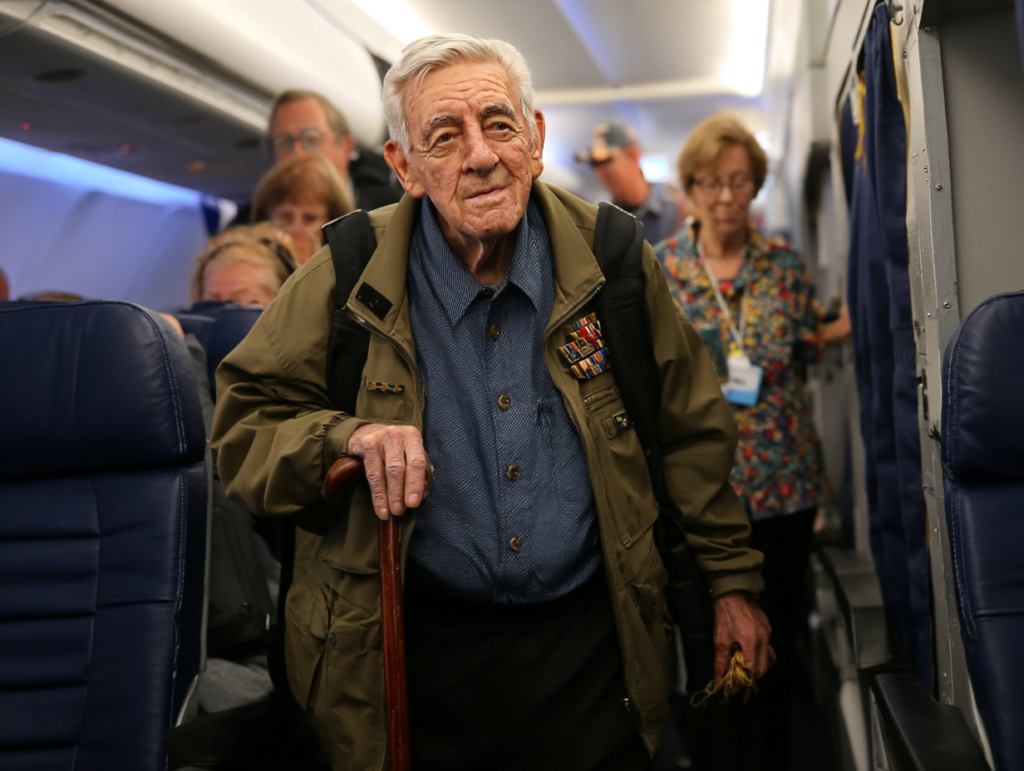
Mara slid into her own seat with a light grin, mouthing, You’re doing it again. Elise laughed softly. Helping strangers wasn’t unusual for her, but something about this man left her quietly unsettled like she’d stepped into a moment whose meaning she didn’t yet understand.
He sat perfectly still for a while, hands resting on his cane, gaze fixed outside. Elise thought he looked moved in a way that didn’t match the simplicity of the exchange, as if her gesture had touched a memory rather than a current inconvenience.

She studied him curiously, wondering what life had shaped those gentle eyes and deliberate movements. She didn’t want to intrude, so she looked away, reminding herself that many older veterans carried emotions close to the surface for their own reasons.
When the plane lifted from the runway, she caught him watching her again—quietly, almost thoughtfully. Something flickered in his expression, something she couldn’t interpret, but she dismissed it as the tension of flying.
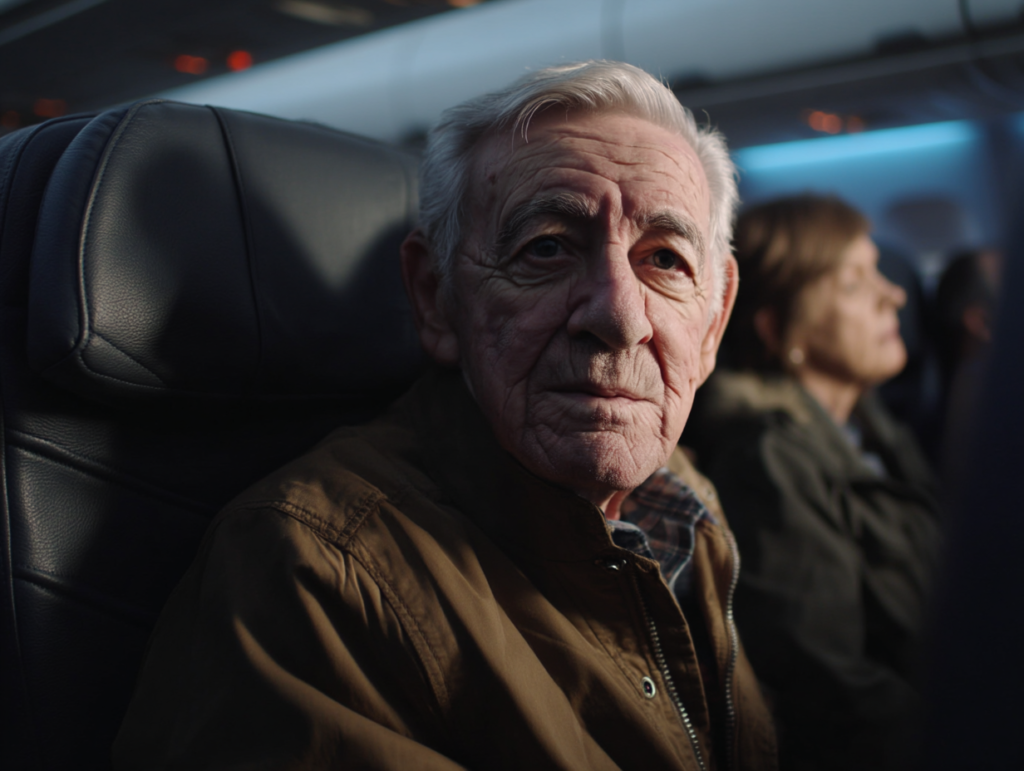
Once they reached cruising altitude, the veteran’s posture loosened. Elise offered a polite greeting, unsure whether he wished to talk. He surprised her with a warm reply, his voice steady but subdued, carrying a depth she recognised from people who’d lived through more than they spoke aloud.
He asked about their trip with an attentiveness that felt genuine rather than obligatory. Elise explained it was a mother–daughter getaway before Mara left for college. His expression softened. Elise wondered if he was thinking about his kids and grandkids.

Their conversation moved gently, led by his thoughtful pauses and careful phrasing. Elise sensed he wasn’t one to waste words; he chose each word with care. It sharpened her need to know more about him, though she kept her questions mild, respecting whatever boundaries shaped his silence.
His gaze, she thought, drifted to her necklace absently. It wasn’t a very expensive piece. It was a flat, gold disc, shaped like a half-moon, threaded on a very thin chain. It was a family heirloom of sorts, which was why she wore it constantly.

Elise touched the pendant absently. She couldn’t help remembering her grandmother, who had passed on about two years ago. The pendant had belonged to her. She had given it to Elise, as Elise would pass it on to Mara.
The veteran suddenly seemed to stiffen by her side, looking away briefly, and blinking as though steadying himself. Elise stared at him for a moment, unsettled but unsure why. She felt worried that he was having some sort of PTSD episode. It wouldn’t be uncommon in veterans, especially with the plane’s closed, cold, and noisy environment.
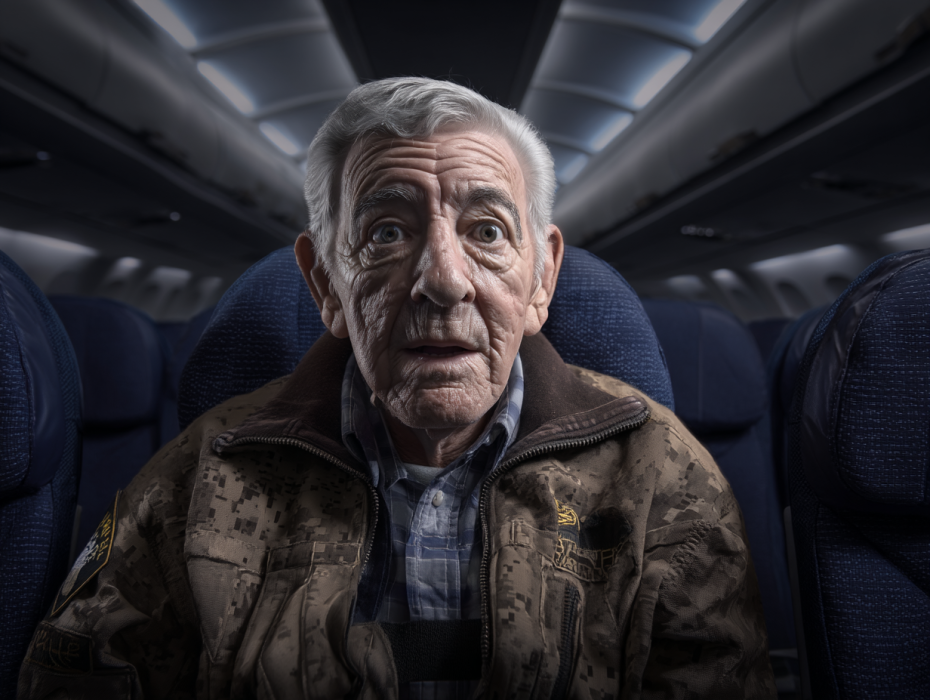
He sat up suddenly and seemed to gasp a bit for air. Elise quickly rang for an airhostess who appeared immediately. “Please get him a bit of water,” Elise said authoritatively. The hostess wasted no time in doing as she was told.
The veteran sipped his water slowly. His hands were trembling so much that Elise wondered if she should hold the glass for him. He seemed to be under the grip of some strong emotion. He sat like that for some time.

Finally, after some effort, he relaxed, finishing the last gulps of water with a long sigh. He turned to her and said, “I’m so sorry. My nerves aren’t what they once were. Sometimes, these episodes come when I’m least expecting it. Sorry for the bother again.”
Elise told him it was alright. She dealt with human emotions in her line of work as a psychologist all the time. Though she knew the old man wasn’t being dishonest, she also sensed that he was keeping something more from her. For now, she let it be as the man seemed to drift into a short nap.

At some point, Elise herself must have dozed off. When she woke up, she found the old veteran studying her longer than casual politeness required. He mumbled when she caught his stare, “Sorry. You remind me of someone I knew.” He didn’t elaborate, simply turned his gaze back to the window.
Elise sensed the remark carried weight, but she didn’t press him. People often saw echoes of familiar faces in strangers. Still, something about the way he said it, almost reverentially, made her wonder who he saw when he looked at her.
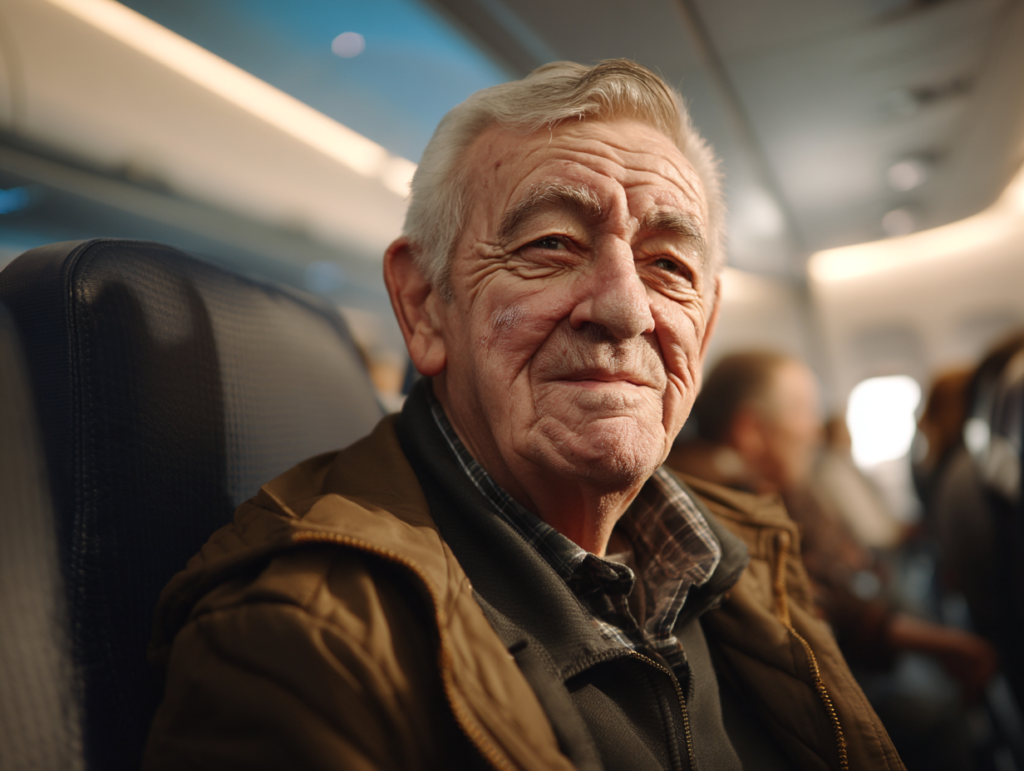
A strange familiarity stirred in her as well, though she couldn’t pinpoint what triggered it. She’d never met him, of course, yet sitting beside him created a faint sensation of déjà vu, a feeling of standing near a door she hadn’t opened in years. She shook her head. She was being silly, as Mara would tell her often enough.
She focused instead on Mara’s light chatter. But she couldn’t ignore the way the veteran occasionally watched her—respectfully, gently, studying without intruding. His expression held a mix of astonishment and restraint, as if he were piecing together something he hadn’t expected.

Elise felt the veteran’s gaze drift toward her necklace again. She almost heard him making up his mind and guessed the question before it popped out of his mouth. After a long moment, he cleared his throat softly. “May I ask… that beautiful pendant you’re wearing—does it have a story behind it?” His voice carried quiet hesitation.
Elise knew instinctively that the man had no ill intentions. She did not mind telling him how it came to her hands, “It belonged to my grandmother,” she said, fingers brushing the worn gold. The veteran nodded slowly. Elise hoped he’d tell her why it fascinated him.

“She wore it every day,” Elise continued, her voice softening. “She passed away not long ago, but I kept it close. Feels like a part of her travels with me when I do.” The veteran’s eyes shimmered, though he blinked quickly to steady himself.
“I’m sorry for your loss,” he murmured, the sincerity in his tone catching Elise off guard. She thanked him, surprised by how deeply his simple words landed, as if he understood a specific kind of absence she hadn’t named. It was easy talking to him because he listened so attentively.
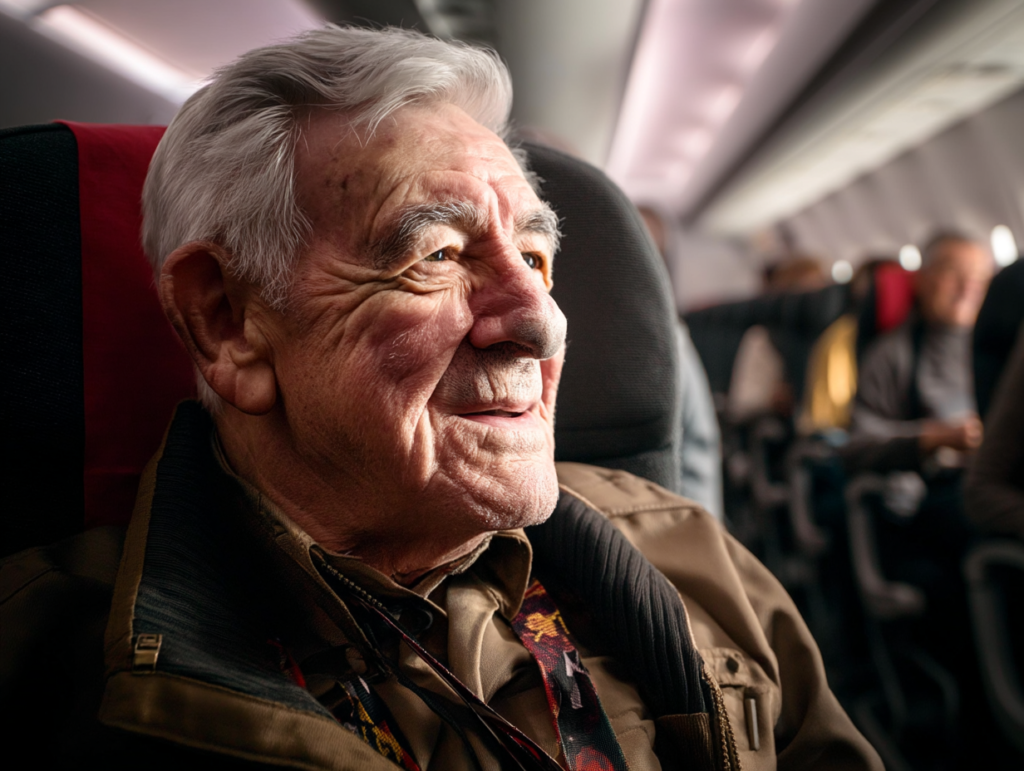
“My grandmother was warm,” Elise said, “but private. She shared stories about raising my dad, but anything before that felt… carefully preserved. She’d smile when we asked, but she never offered details. We stopped pressing after a while. She had undergone a lot through the war, lost family.”
The veteran listened intently, but his posture tightened ever so slightly. Elise chided herself for bringing up a mention of the war so tactlessly. No doubt the man must’ve fought battles and lost friends, too. How could she, who prided herself on being so acutely sensitive to human nature, have been so callous?
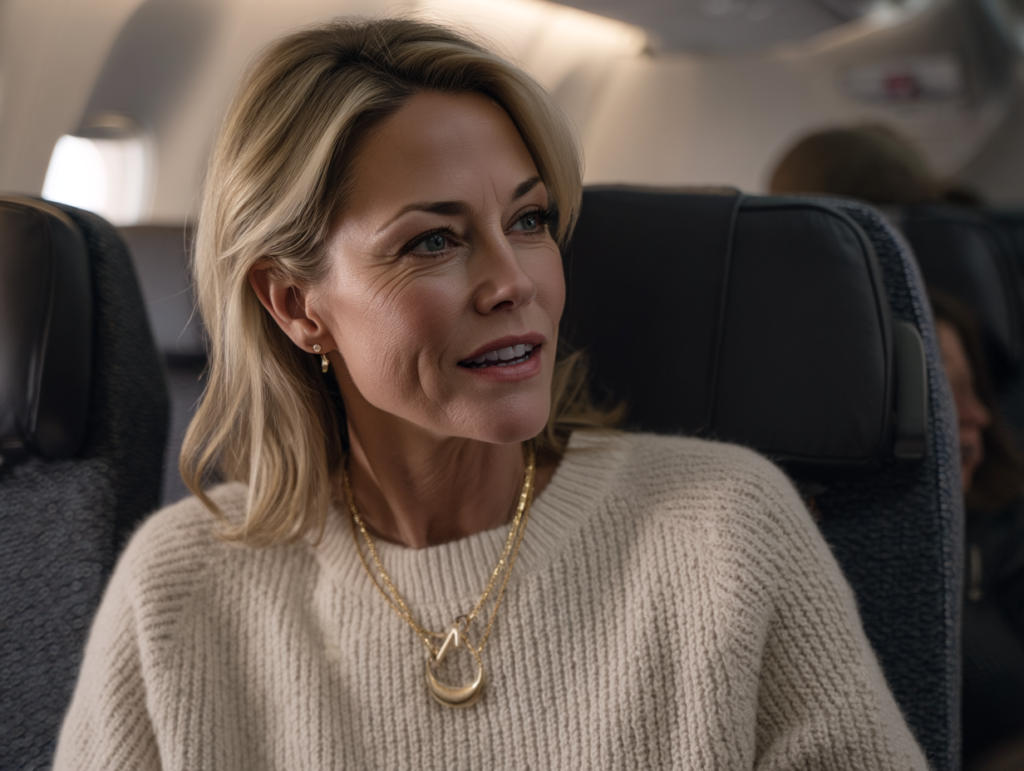
Elise continued talking about her grandmother to put him at ease. “She wasn’t secretive,” Elise added, “just… protective of whatever came before. I always figured she’d tell us when she was ready. When she passed, those pieces of her life stayed where she’d left them.”
The veteran swallowed, his jaw moving as though he were holding back words. He looked down at his own hands as if they carried memories just as untold. Elise felt a brief urge to ask him about his life and family, but she held it back.

“I wonder,” Elise said, almost to herself, “If she can look down from above and see us now. I wish she could see what a wonderful family she helped raise.” The veteran nodded and let out a slow, controlled breath, his gaze fixed on the pendant again. Elise felt again that he wanted to ask something more, but was holding back.
Elise glanced at him with gentle concern. She couldn’t imagine what war memories he carried. She wanted to prod him to talk more about the days before the war and what it felt like to fight for your country. However, she also knew that human grief was fragile and that some things were best left alone.

The veteran shifted slightly, glancing at Elise’s necklace again before speaking in an almost absent-minded tone. “I’m flying out to meet family, too. My wife died recently, and my son lives in the city.” Elise smiled in reply. She felt a protective warmth toward this ancient man.
“That’s amazing. So great to have family around,” she replied. “Mara and I are actually heading out to be with my dad. He used to take care of my grandmother.” The veteran nodded once. Elise waited for him to ask something that seemed to be at the tip of his tongue, but he changed his mind and simply looked back out the window.

Elise tried to brush off the feeling, telling herself that she should stop reading more into people’s ordinary mannerisms. Still, a quiet curiosity stirred in her. Why did it seem like she already knew this sweet old soul? Should she say something to him?
She offered a polite smile, assuming the conversation had reached its natural end. She rationalized that he probably reminded her of someone she had met. As a psychologist, she had talked to many patients and veterans; maybe that was what was so familiar about him.

Mara tapped her arm, asking for headphones, and the moment slipped away. Elise’s mind lingered on the man, but she did not want to pry into his life. Life was full of these strange overlaps, she reminded herself. Nothing more.
A sudden tremor jolted the cabin. The plane dipped slightly before correcting, sending a whisper of tension through the passengers. Mara stiffened, startled by the shift, and Elise instinctively reached for her hand. The turbulence wasn’t severe, but it rattled the atmosphere instantly.

Before Elise could reassure her daughter, the veteran moved with surprising quickness. His arm braced gently in front of Mara, steady and protective, like muscle memory responding before thought. Elise noticed the reflex, swift and precise. She felt something in her chest tighten.
He apologized quietly once the plane leveled out, withdrawing his arm with a hint of embarrassment. Elise thanked him, touched by the instinctive gesture, but unsettled by how natural it seemed for him to shield them without hesitation. She again wrote it down to the instinctive kindness of a man who had protected his country.
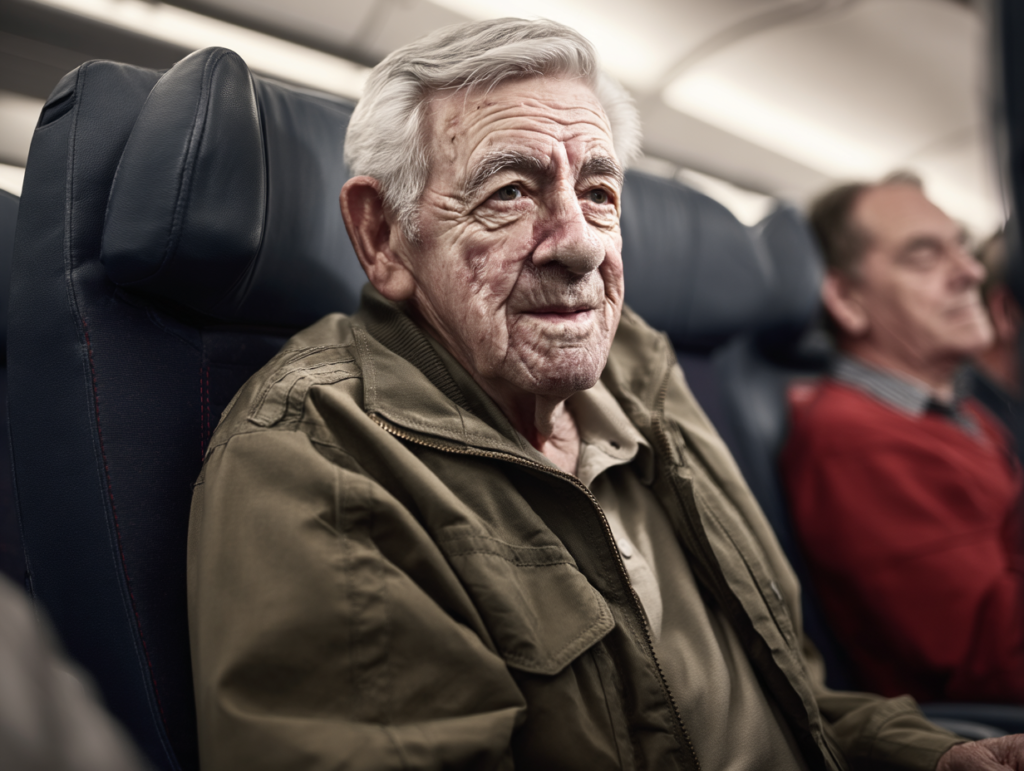
As calm returned to the cabin, the veteran exhaled shakily and whispered something under his breath—a name, or maybe a place. Elise caught only a fragment, but it caught her attention. She wondered if she imagined him saying it.
She turned toward him, trying to place the word, but he had already composed himself, staring firmly out the window. Elise let it go. It was probably nothing, just her mind playing tricks and connecting things that had no connection.

A little later, while searching her phone for a video, Mara accidentally opened a folder of old family photos. Elise leaned in, wanting to see which memory her daughter had stumbled on. Sunlit images of holidays and birthdays scrolled past in rapid succession.
Then, without warning, a black-and-white picture filled the screen—her grandmother in her twenties, eyes bright, hair pinned neatly, wearing the same pendant Elise now carried. They had found the old photo while clearing up after her grandma’s funeral. Mara had taken a pic of it to send to the relatives.
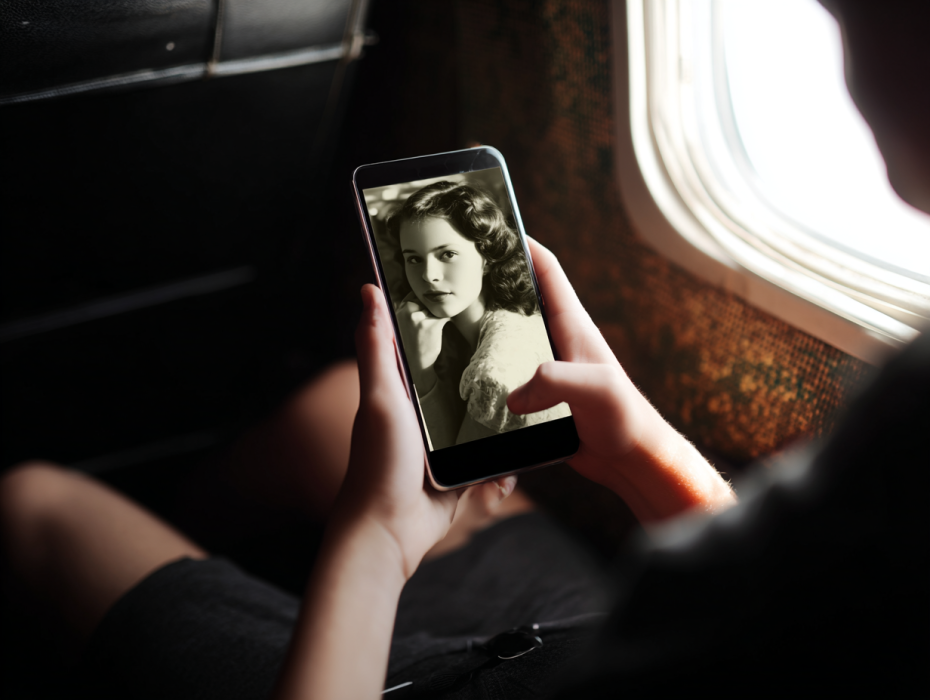
But what should have been a warm moment shifted suddenly. The veteran’s reaction was instantaneous. His breath hitched, loud enough for Elise to notice. He stared at the screen with a look so raw and unguarded that Elise instinctively covered the phone, confused and alarmed by the sudden shift.
Color drained from his face. He tried to steady himself, fingers gripping his cane as if anchoring to something real. His eyes didn’t leave the image, even as Elise lowered the phone. His expression held a mixture of awe and grief Elise didn’t understand.
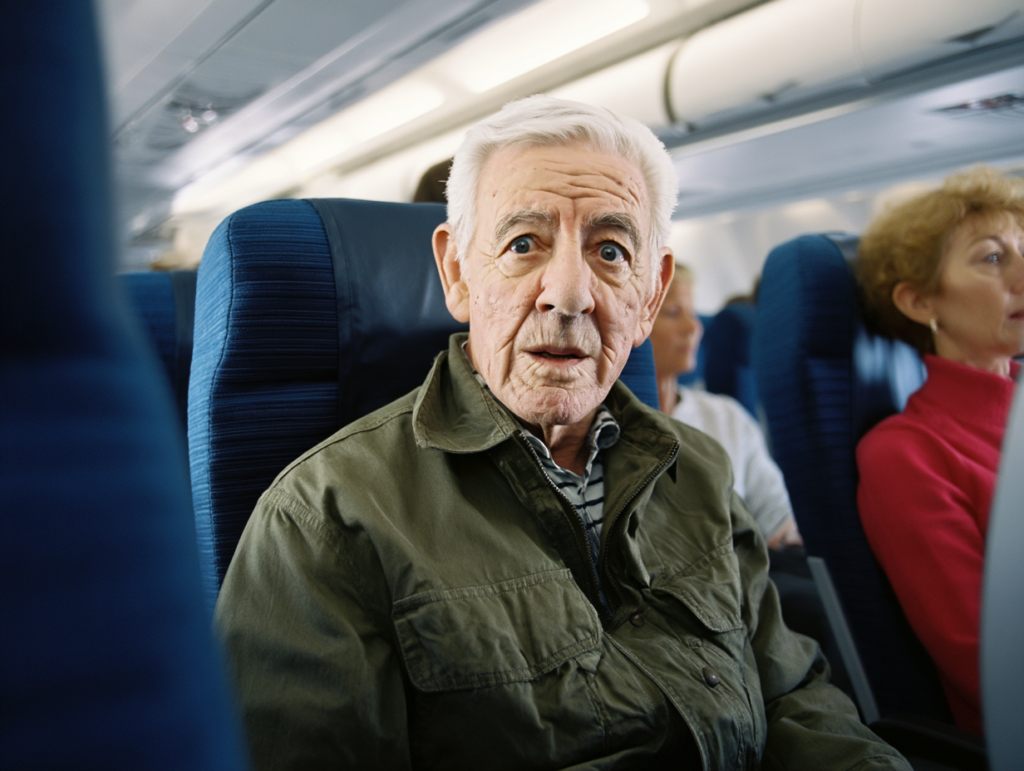
Mara whispered, “Is he okay?” Elise wasn’t sure. The veteran pressed his lips together tightly, fighting a wave of emotion that seemed to fracture his composure. She’d never seen someone respond to a photo with such intensity. It was as if the man had seen a ghost.
After several seconds, he cleared his throat, voice thin. “Excuse me,” he managed. He stood slowly, using the armrest for support, and shuffled toward the lavatory without meeting either of their eyes. Elise watched him go, unsettled by the tremor in his movements.
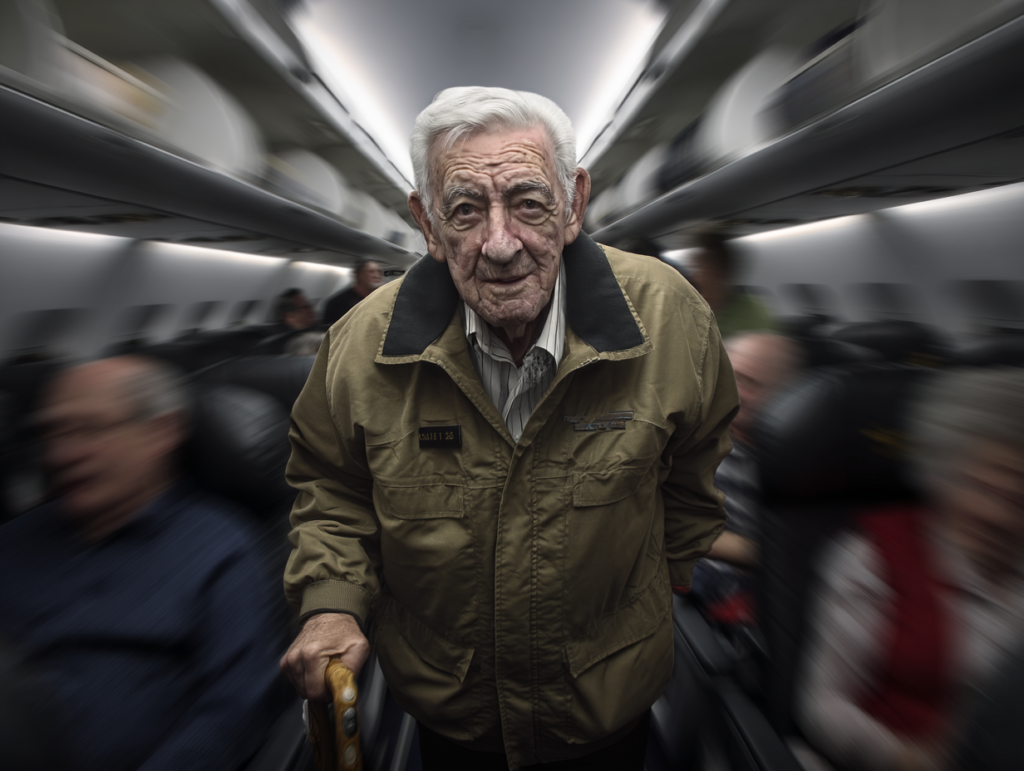
He closed the lavatory door behind him, and Elise imagined him leaning against it, gathering himself. She didn’t know what to make of any of it—his reaction to the necklace, and now this overwhelming response to her grandmother’s photo.
Mara looked at her, worried. Elise tried to reassure her, though her voice faltered. “Maybe she reminded him of someone he knew,” she said. But the explanation rang hollow even as she spoke it. Did the veteran know her grandma?
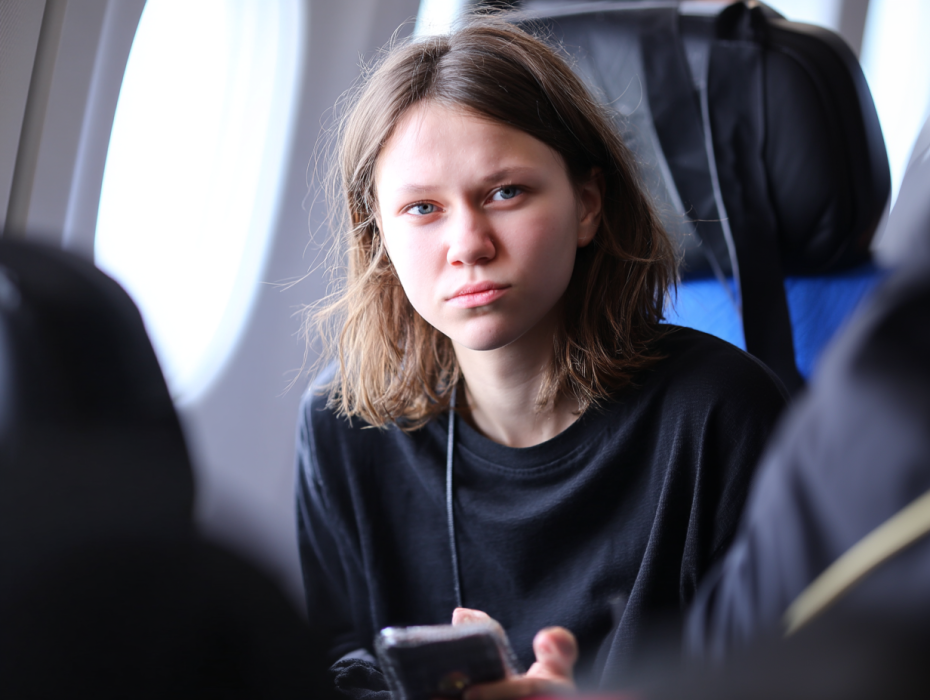
Still, Elise didn’t know what to do about it. Her grandmother rarely spoke about her life before marriage to her grandpa, and they knew so little about the people from that time. Elise wondered whether the veteran had seen someone who resembled her, or whether he truly knew her. Grandpa himself had died a couple of years before Grandma.
Eventually, she decided not to speculate. There were too many possible stories behind a single photograph, and she didn’t want to leap to conclusions. But somewhere inside, a seed of curiosity was beginning to take root, refusing to be dismissed.
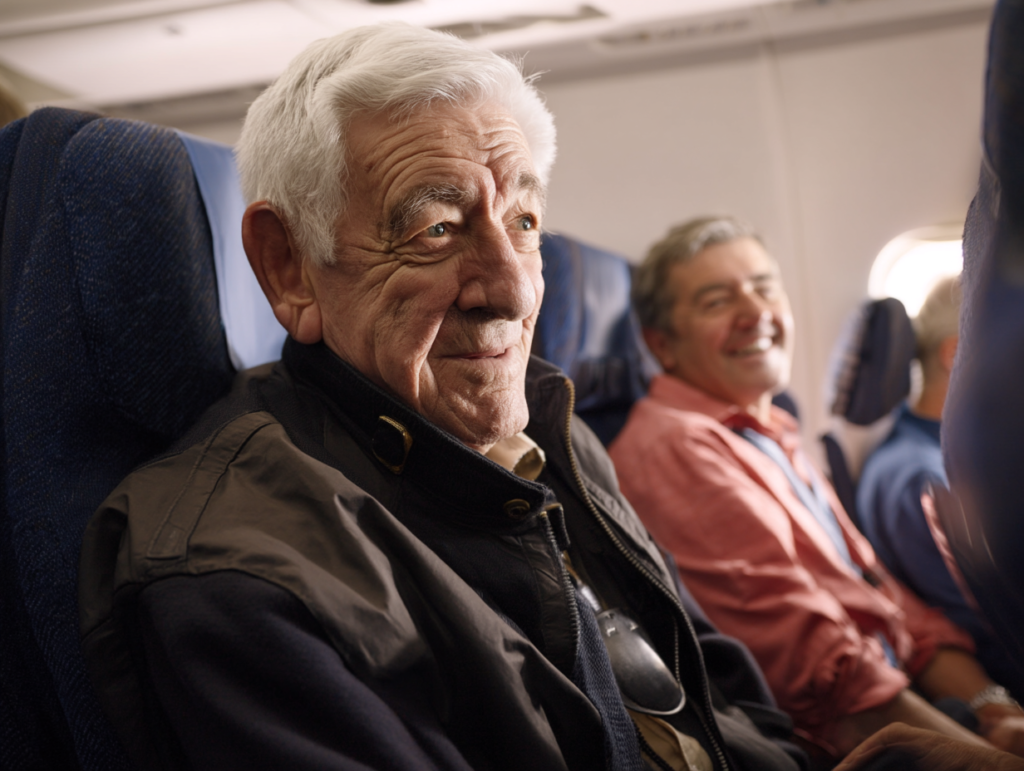
When the veteran returned, his eyes were red but clearer. He apologized softly, saying the picture had stirred old memories. Elise nodded understandingly, waiting to see if he would offer anything more. He took a deep breath, as if weighing how much truth to share.
“I served during World War 2,” he said quietly. “But my role wasn’t the kind I could speak about. Even now, parts of it feel like they belong to another life entirely.” His tone wasn’t boastful, just weary, and shaped by years of carrying unspoken weight.

Elise sensed the edges of something complicated unraveling. She encouraged him gently without pressing. The veteran continued, explaining how he’d spent years moving between assignments, often without knowing where he’d be sent next. Elise guessed that he must’ve worked for Allied Intelligence.
“There were things we were asked not to discuss,” he said. “Not with our families. Not with anyone. Some of us disappeared from our old lives without choice. We were too valuable an asset to lose, and yet, they feared we would fall into enemy hands.” There was no bitterness in his voice, only a quiet acceptance of what happened.

He paused, fingers tracing the rim of his cane. “And some of us were ordered to remain dead. For everyone’s safety. After the war, I rebuilt my life and identity.” Elise felt a chill at the matter-of-fact way he said it, as if vanishing from one’s own life was simply another assignment.
He didn’t elaborate, but the weight behind his words made Elise’s stomach tighten. She wondered what kind of danger could require a person to abandon everything and how someone could live with the emptiness left behind.
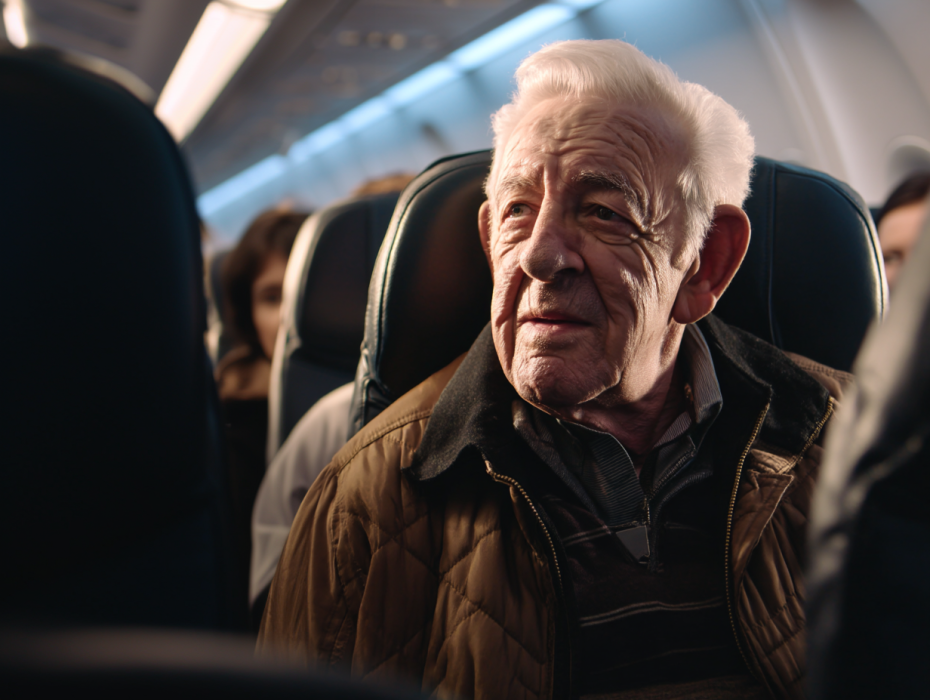
He shifted in his seat, glancing at her pendant again. “There were people I thought of often,” he said, voice lower. “People I wished I could see again, if only to know they were safe.” Elise heard the ache beneath the controlled tone.
The sadness in his eyes made her heart twist. She recognized that kind of longing—her grandmother had worn it sometimes, usually when she thought no one was watching. Elise had always assumed it was grief. Maybe it had been something else entirely.

Elise placed a hand lightly on the armrest between them, offering silent comfort. She didn’t ask questions; she sensed he wasn’t ready to speak the whole truth, and she respected the boundaries he held so tightly around himself.
Still, she felt the quiet gravity of his regret pressing into the space between them. Whatever he’d lived through, whatever he’d lost, had carved itself deeply into him. Elise found herself wanting to understand, but not wanting to push him there before he was ready. She figured she would speak until he felt ready to share his story.

Elise found herself filling the quiet with memories she hadn’t revisited in years. “My grandmother never talked about her early adulthood,” she said. “It was the one part of her life she always sidestepped. Even my dad didn’t know much. She kept those years locked away. The war must’ve displaced so many people and their dreams.”
The veteran listened with an intensity that made Elise slow her words. “Sometimes,” she added, “I think something happened back then that she didn’t have the strength to unpack. She’d drift off during certain songs or dates. Like she was remembering someone she’d never spoken of.”

“Like, for instance, there was that photo. She kept it tucked in her bible,” Elise continued. “Just one. A young man in a uniform. The picture was so faded it almost didn’t feel real. Dad said she refused to throw it away, no matter how much the image disappeared.”
Elise smiled sadly. “We don’t know who he was. She never said. She’d just close the bible gently, like the photograph was something fragile she couldn’t bear to explain.” The veteran’s breathing grew uneven, his knuckles whitening around his cane.
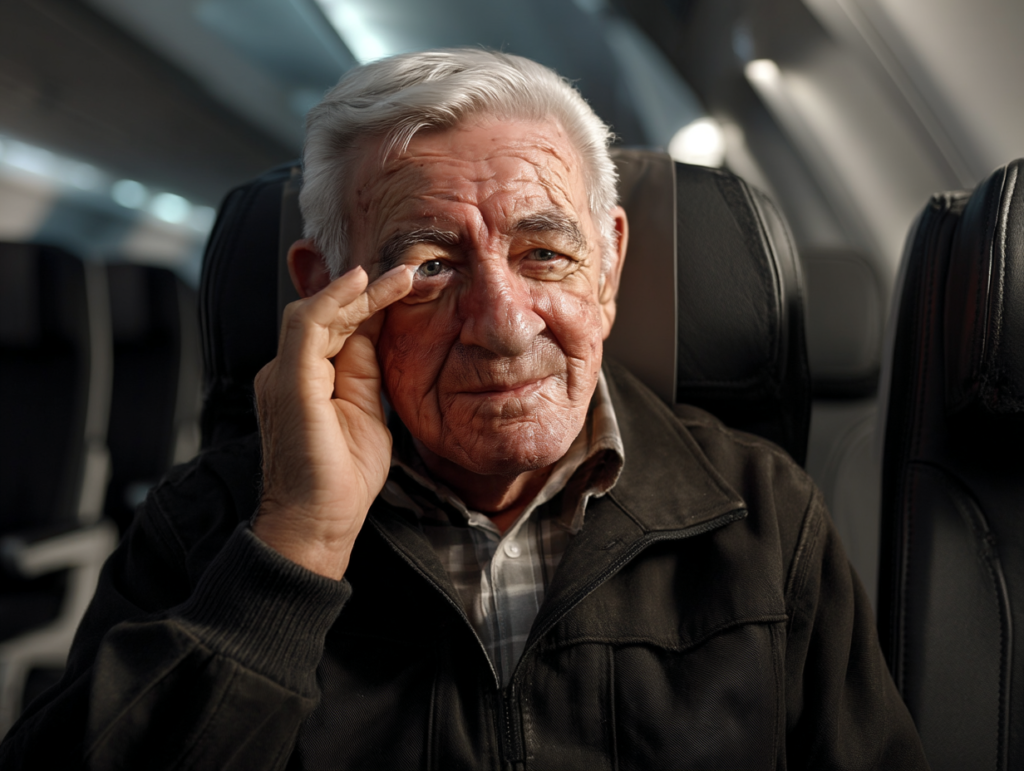
When she glanced at him again, the emotion he’d tried so hard to contain trembled at the surface. His shoulders shook faintly. His eyes were wet, not with sentimentality but with something weightier—recognition, fear, longing, Elise couldn’t tell. “Are you alright?” she whispered gently.
He didn’t answer at first. His mouth opened, then closed, desperation flickering across his face. The plane hummed around them, oblivious. Elise reached out instinctively, her hand hovering near his arm, unsure how to steady someone unraveling so quietly.
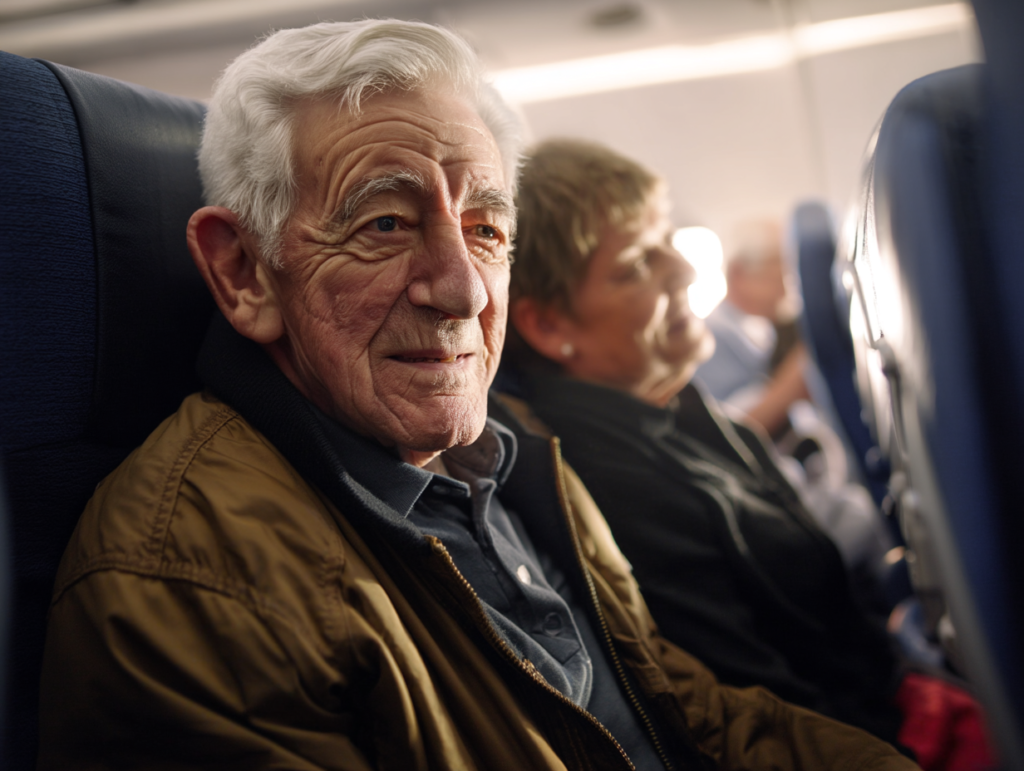
His voice emerged low and strained. “The bible… did it have a pressed flower between the pages?” he asked. “Or a note, folded small—just one line?” Elise froze. She had never mentioned those details. Only she and her father knew about them. If she had an inkling before, it was growing into a certainty.
Elise stared at him, her pulse thudding in her ears. “How… how could you possibly know that?” Her voice was barely audible. The veteran looked at her with a sorrow so deep it seemed carved from decades of silence.

There was no mistaking it anymore. This wasn’t a coincidence. This wasn’t vague recognition. This man knew her grandmother. It was no longer about the shared trauma of the war. Elise felt the air around them shift, the truth rising between them like something long buried, finally breaking free.
He leaned closer, his voice trembling. Then he whispered her grandmother’s full maiden name—clearly, perfectly, the way someone would say it after years of holding it gently in their memory. Elise felt the breath leave her body. No one outside the family ever used that name.
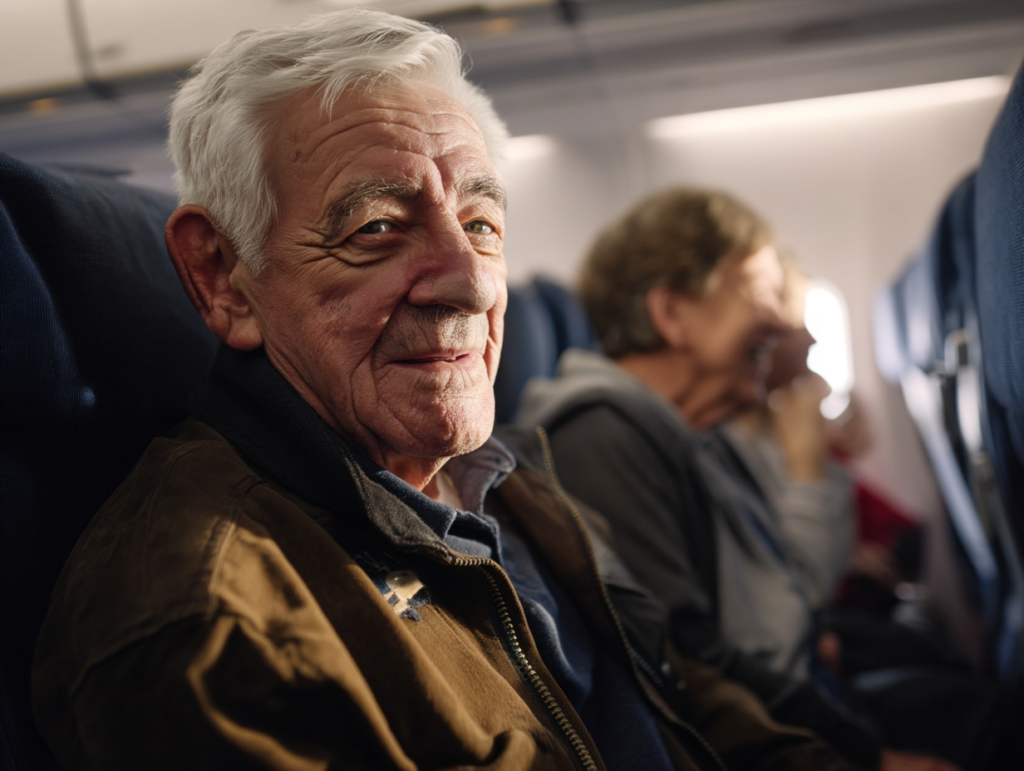
“I didn’t die,” he said softly. “At least, not the way they were told. I was ordered to disappear. I loved her—your grandmother—and I never stopped. Elise, you look so much like her.” The cabin noise faded; her world narrowed to the man sitting inches from her.
He swallowed hard, eyes shimmering. “I was recruited as a courier for intelligence that the Allies couldn’t let fall into enemy hands. People were hunting us. If they knew about her, about the baby she was carrying…they would have used them to get to me. My survival depended on vanishing.”
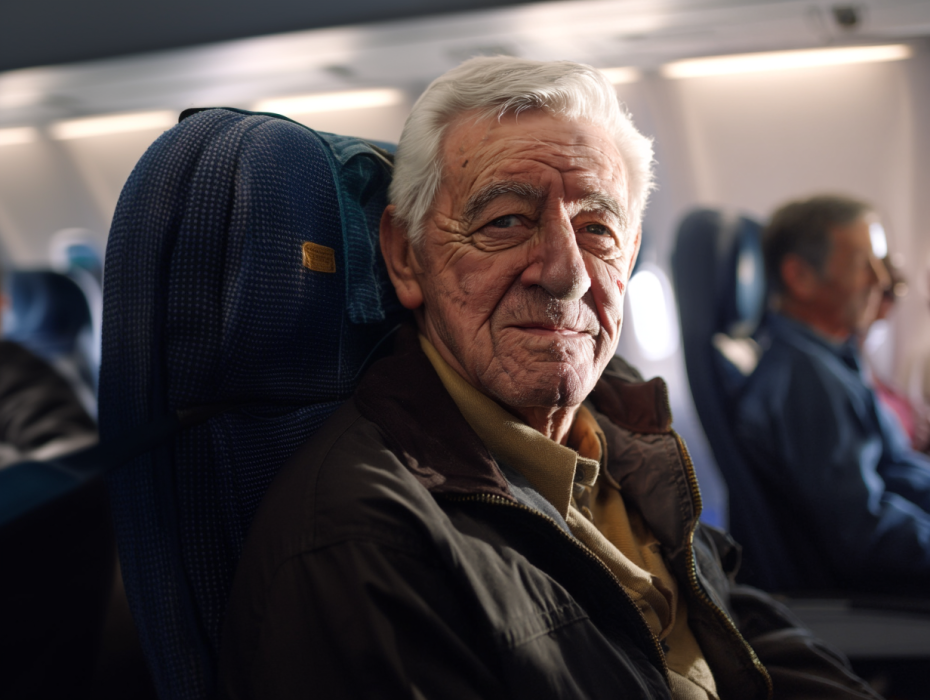
He looked down, voice cracking. “After the war, I learned she’d rebuilt her life. She thought I was dead. She married. Had a family. The government forbade any contact, and I thought… I thought leaving her in peace was kinder than tearing her world open again.” Tears slipped down his cheeks unchecked.
Elise struggled to breathe, mind racing. Her father—her father, who had grown up believing a different man was his dad—had no idea. “He’s alive,” she whispered. “My dad, grandma’s eldest son… he’s alive, and he’s here.” The veteran nodded, fear flickering across his face.

“He doesn’t know about me?” he asked sadly. Elise said quietly. “I don’t think he does.” The veteran’s hands trembled again, heartbreak etched into the lines of his face. “I always prayed he had a good life,” he whispered. “I never expected to… to see any of you. When I saw that pendant…”
Elise’s fingers shook as she opened her phone. “I need to call him. He will want to know.” She connected to the in-flight Wi-Fi, her heartbeat pounding as she hit the video call button. Her father answered immediately, surprised to hear from her mid-flight.

“Dad,” she said, voice unsteady, “you need to come to the airport. Right now. I found someone… someone you need to meet.” Her father’s confusion deepened, then cracked when he heard the tremor in her voice. “I’ll be there,” he said without hesitation.
As the plane began its descent, Elise imagined her father driving with shaking hands, questions colliding with hope. The veteran kept his gaze lowered, gripping the armrests, as though bracing for a judgment he feared he deserved.
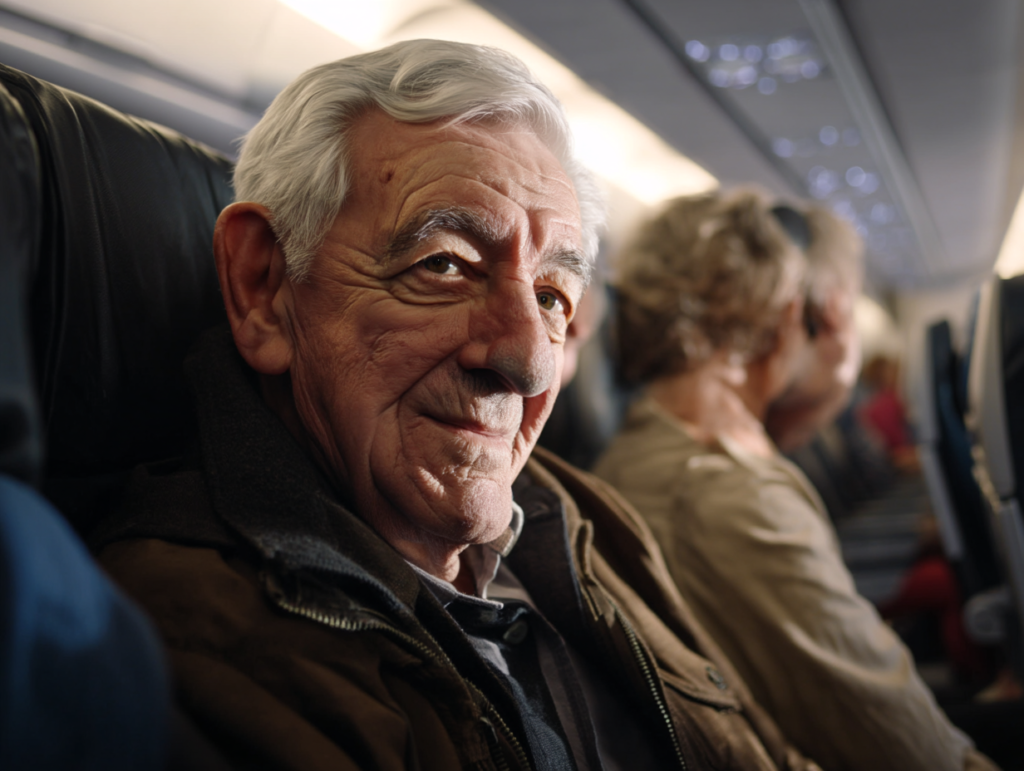
He looked at Elise with eyes full of apology. “He might hate me,” he whispered. “For not being there. For leaving.” Elise shook her head gently. “If anyone will understand, he will,” she said. “Because Grandma did.” The veteran closed his eyes, letting her words steady him.
When they reached arrivals, Elise spotted her father near the railing, breathless and pale. The veteran paused, leaning heavily on his cane. Their eyes met—father and father, two strangers bound by a lifetime of silence, and the world seemed to hold its breath. And suddenly, Elise saw the similarity she hadn’t been able to pin down earlier.

Then her father stepped forward, shaking, and the veteran lifted his arm with tentative hope. Their embrace was slow, trembling, years overdue. Elise felt Mara slip her hand into hers as four generations stood together—proof that a single act of kindness had stitched a family back into place.
